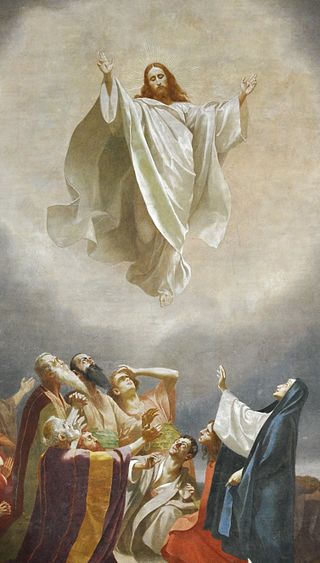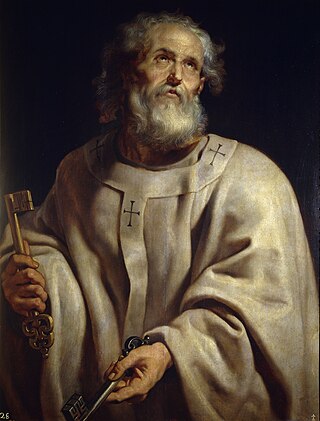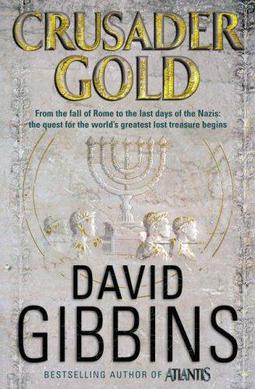
The Second Coming is the Christian and Muslim belief that Jesus Christ will return to Earth after his ascension to Heaven. The idea is based on messianic prophecies and is part of most Christian eschatologies. Other faiths have various interpretations of it.

The Ascension of Jesus is the Christian belief, reflected in the major Christian creeds and confessional statements, that Jesus ascended to Heaven after his resurrection, where he was exalted as Lord and Christ, sitting at the right hand of God.

The Great Apostasy is a concept within Christianity to describe a perception that mainstream Christian Churches have fallen away from the original faith founded by Jesus and promulgated through his Twelve Apostles.

I, Claudius is a historical novel by English writer Robert Graves, published in 1934. Written in the form of an autobiography of the Roman Emperor Claudius, it tells the history of the Julio-Claudian dynasty and the early years of the Roman Empire, from Julius Caesar's assassination in 44 BC to Caligula's assassination in AD 41. Though the narrative is largely fictionalized, most of the events depicted are drawn from historical accounts of the same time period by the Roman historians Suetonius and Tacitus.

Apotheosis, also called divinization or deification, is the glorification of a subject to divine levels and, commonly, the treatment of a human being, any other living thing, or an abstract idea in the likeness of a deity.

Two names and a variety of titles are used to refer to Jesus in the New Testament. In Christianity, the two names Jesus and Emmanuel that refer to Jesus in the New Testament have salvific attributes. After the crucifixion of Jesus the early Church did not simply repeat his messages, but focused on him, proclaimed him, and tried to understand and explain his message. One element of the process of understanding and proclaiming Jesus was the attribution of titles to him. Some of the titles that were gradually used in the early Church and then appeared in the New Testament were adopted from the Jewish context of the age, while others were selected to refer to, and underscore the message, mission and teachings of Jesus. In time, some of these titles gathered significant Christological significance.

The Feast of the Ascension of Jesus Christ commemorates the Christian belief of the bodily Ascension of Jesus into Heaven. It is one of the ecumenical feasts of Christian churches, ranking with the feasts of the Passion and Pentecost. Following the account of Acts 1:3 that the risen Jesus appeared for 40 days prior to his Ascension, Ascension Day is traditionally celebrated on a Thursday, the fortieth day of Easter according to inclusive counting, although some Christian denominations have moved the observance to the following Sunday, sometimes called Ascension Sunday. The day of observance varies by ecclesiastical province in many Christian denominations, as with Methodists and Catholics, for example.

Matthew 5:5 is the fifth verse of the fifth chapter of the Gospel of Matthew in the New Testament. It is the third verse of the Sermon on the Mount, and also the third of what are known as the Beatitudes.

The Hulsean Lectures were established from an endowment made by John Hulse to the University of Cambridge in 1790. At present, they consist of a series of four to eight lectures given by a university graduate on some branch of Christian theology.
David Gibbins is an underwater archaeologist and a bestselling novelist.

In Christianity, the Confession of Peter refers to an episode in the New Testament in which the Apostle Peter proclaims Jesus to be the Christ. The proclamation is described in the three Synoptic Gospels: Matthew 16:13–20, Mark 8:27–30 and Luke 9:18–21. Depending on which gospel one reads, Peter either says: 'You are the Messiah' or 'the Christ' ; or 'You are the Messiah, the Son of the living God',, or 'God's Messiah' or 'The Christ of God'.

The Seven Seals of God from the Bible's Book of Revelation are the seven symbolic seals that secure the book or scroll that John of Patmos saw in an apocalyptic vision. The opening of the seals of the document occurs in Rev Ch 5–8 and marks the Second Coming of the Christ and the beginning of The Apocalypse/Revelation. Upon the Lamb of God/Lion of Judah opening a seal on the cover of the book/scroll, a judgment is released or an apocalyptic event occurs. The opening of the first four Seals releases the Four Horsemen, each with his own specific mission. The opening of the fifth Seal releases the cries of martyrs for the "Word/Wrath of God". The sixth Seal prompts plagues, storms and other cataclysmic events. The seventh Seal cues seven angelic trumpeters who in turn cue the seven bowl judgments and more cataclysmic events.

Françoise Mélanie Calvat, religious name Mary of the Cross, was a French religious sister in the Roman Catholic church. She and Maximin Giraud were the two seers of Our Lady of La Salette.

The Bread of Life Discourse is a portion of the teaching of Jesus which appears in chapter 6 of John's Gospel and was delivered in the synagogue at Capernaum.

Saint Peter, also known as Peter the Apostle, Simon Peter, Simeon, Simon, or Cephas, was one of the Twelve Apostles of Jesus Christ and one of the first leaders of the early Christian Church. He appears repeatedly and prominently in all four New Testament gospels as well as the Acts of the Apostles. Catholic tradition accredits Peter as the first bishop of Rome—or pope—and also as the first bishop of Antioch.

Crusader Gold is an archaeological adventure novel by David Gibbins. First published in 2006, it is the second book in Gibbins's Jack Howard series. It has been published in more than 20 languages and was a New York Times bestseller.

The Tiger Warrior is an archaeological adventure novel by David Gibbins. First published in 2009, it is the fourth book in Gibbins' Jack Howard series. It has been published in 18 languages and was a New York Times bestseller.

The Gods of Atlantis is an archaeological adventure novel by New York Times and London Sunday Times bestselling author David Gibbins. First published in 2011, it is the sixth book in Gibbins' Jack Howard series.
















